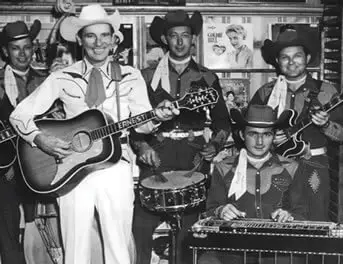An articulation of a sudden and unforeseen end to one’s hopes or plans.
That’s all she wrote
What's the meaning of the phrase 'That's all she wrote'?
What's the origin of the phrase 'That's all she wrote'?
This is very much an American expression so let’s begin with a clarification for readers in the UK where it isn’t in common use. The phrase is used to convey the meaning of ‘it’s all over; there’s no more to be said’. When seeking the expression’s origin it would help to know who ‘she’ was and what exactly it was that she wrote. As we shall see, and as so often with etymology, that’s not entirely clear.
The popular version of the origin of this expression is that it is the punch line of a mournful tale about an American GI serving overseas in WWII. The said sad serviceman is supposed to have received a letter from his sweetheart. He reads it to his colleagues: “Dear John”. Well, go on, they say. “That’s it; that’s all she wrote”. The story is plausible; ‘Dear John’ was the standard cipher amongst the US military for the kind of letter that has now been replaced by a ‘you’re so dumped’ text message.
The ‘Dear John’ usage came into being at about the time of WWII. There are several references in 1940s newspapers to ‘Dear John’ letters that were sent by Franklin Roosevelt, who is sometimes credited with originating the term. These appear to be red herrings in the search for the origin of the phrase and merely allude to letters that FDR sent to prominent public figures who happened to be called John – John Lord O’Brian and John Maynard Keynes for example.
The earliest example I can find that refers to ‘Dear John’ letters with the commonplace meaning is from the Florida newspaper the St. Petersburg Times, March, 1944:
The things that brought tears to their eyes included… the downcast GI about whom another told them “He just got a Dear John letter.”
Those citations give us an approximate date for the emergence of the expression but not the actual source. We may choose to believe the tale about the GI whose letter consisted of just “Dear John” but there’s no evidence of any sort to support it.
A more plausible source is a country music song titled ‘That’s All She Wrote’, recorded by Ernest Tubb and published in sheet music form in 1942:
I got a letter from my mama, just a line or two
She said listen daddy your good girl’s leavin’ you
That’s all she wrote – didn’t write no more
She’d left the gloom a hanging round my front door.
[If you want to hear it, and it is a classic of the country music genre, follow this link to YouTube.]
More plausible it may be but it’s likely that Tubb picked up the expression from popular usage rather than coined it himself. An example in print that precedes the release of his song on disc is from a column in the Texas newspaper The Brownsville Herald, June 1935:
No power except that of the legislature can change the rolls. The assessor-collectors do not have the power, the commissioners’ courts do not have the power. That’s all she wrote and it’s final, the attorney general says in language much more eloquent and technical.
The usage in that extract seems to suggest that the writer was using it figuratively (that is, there wasn’t a specific ‘she’ that the piece related to) and also expected the reader to understand what it meant. If that is the case then the expression may well have originated before 1935 – we’ll just have to keep looking.
See other phrases that were coined in the USA.
The history of “That ‘s all she wrote” in printed materials
Trend of that ‘s all she wrote in printed material over time
Related phrases and meanings
Browse more Phrases
About the Author

Phrases & Meanings
A-Z
A B C D E F G H I J K L M N O P Q R S T UV W XYZ
Categories
American Animals Australian Bible Body Colour Conflict Death Devil Dogs Emotions Euphemism Family Fashion Food French Horses ‘Jack’ Luck Money Military Music Names Nature Nautical Numbers Politics Religion Shakespeare Stupidity Entertainment Weather Women Work
How did we do?
Have you spotted something that needs updated on this page? We review all feedback we receive to ensure that we provide the most accurate and up to date information on phrases.
